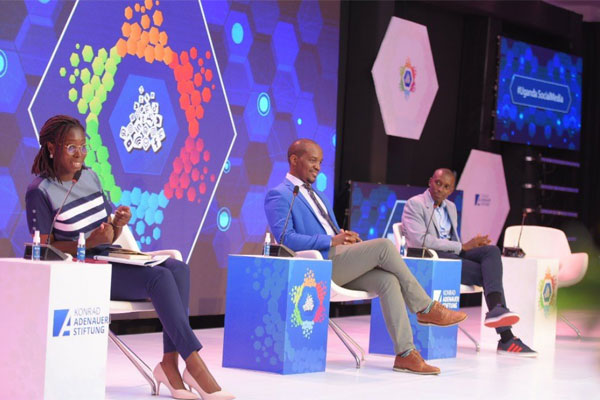Prime
Social media addiction increases risk of developing mental health- experts

Some of the panelists pictured at the sixth edition of social media conference on august 25, 2021. Photo/ courtesy
What you need to know:
- Other panelists called for national and global action against social media giants which have allegedly amassed unlimited power and increasingly become arbitrary in moderating public discourse.
- One of the panelists, Mr Moses Owiny, the executive director Centre for Multilateral Affairs Uganda (CfMA), believes that diplomats should be able to adapt to the changing trends in technology in the digital space and be able to communicate effectively without causing tension.
A study done by the American Journal of Epistemology found the link between mental health and social media lies in the lack of in person interactions. More often than not, millennials communicate online rather than in person, through not just messages, but also pictures, videos, comments, and likes, particularly on platforms such as Facebook, Twitter and Instagram, among others.
Although the study found that depression and social media had no direct relationship, the research concluded that it does “increase the risk of mental health problems and might compromise well-being more generally.”
This is why health experts in Uganda agree with the study to some extent.
Dr Benedict Akimana, a psychiatrist at Butabika Hospital thinks the situation in Uganda has been worsened by the Covid-19 pandemic and the economic lockdown that followed.
“Quite a number of people have been affected by the Covid-19 situation. Many people have suffered depression due to loss of jobs, loss of relatives, adjustment orders at work places have also set in, among others,” Dr Akimana said Wednesday during the sixth edition of social media conference organized by Konrad-Adenauer-Stiftung (KAS) in Kampala.
Dr Akimana further observed that some internet users have developed a tendency of judging their bodily looks by what they see on social media yet social media is not only about having an amazing life.
“What happens when someone posts something on social media and they don’t get the number of likes they hoped for? It gets to them. They start feeling less worthy, others develop suicidal thoughts or isolate themselves because they think people are having more amazing lives than theirs,” he added.
According to Dr Paul Kasenene, a wellness and nutrition Specialist who was one of the panelists at the virtual conference, spending more time on social media makes one restless and more addicted in the long run.
“You cannot even conceive getting off your phone unless you’re aware that being on phone all the time can cause mental breakdown. As long as you start to notice change in your behavior or mood then you should be aware of what’s likely to happen. The choices that you make are really because of your brain health. Try digitally detoxicating yourself. Do physical exercises which create the same craving you’re looking for on social media. Eat well to make your brain better. Learn new things which will take attention away from social media,” he said.
“We need to get people away from these platforms in addition to creating more awareness on the dangers of over use of social media. This can be through doctors, parents and tech companies,” Dr Kasenene added.
This is may be so because it’s difficult to regulate private companies like social media platforms, as argued by Ms Claire Leduc, cooperation attaché at French Embassy.
According to her, a user has the power to choose who to follow on social media and what type of content to consume.
“If some content is making you feel in a certain way, then unfollow such accounts. There are accounts which are promoting body positivity. It all comes back to us (users) so choose what you want to see,” she argued on the first day of the two-day conference (August 25, 2021).
Other panelists at the virtual conference also discussed climate change, digital diplomacy, emerging digital threats (trafficking, extremism, and radicalization), citizen journalism vs digital newsrooms, rebirth of social media and digital politics in Africa, among others.
One of the panelists, Mr Moses Owiny, the executive director Centre for Multilateral Affairs Uganda (CfMA), believes that diplomats should be able to adapt to the changing trends in technology in the digital space and be able to communicate effectively without causing tension.
He also suggested that diplomats need to be careful about how they navigate the cyber terrain because of the developments in technology today.
Other panelists called for national and global action against social media giants which have allegedly amassed unlimited power and increasingly become arbitrary in moderating public discourse.
“These social media platforms are very important, and we want the younger generation to also utilize them for things like business. We just need to have a global conversation on how they are regulated,” said Mr Awel Uwihanganye, Founder, LéO Africa Institute.
Ms Agnes Igoye, deputy national coordinator for prevention of trafficking in persons urged social media users to be vigilant and do due diligence on the persons they interact with to avoid putting themselves in harms’ way.
"As you meet, socialize and date online, please first do due diligence on the person(s) you're interacting with. Traffickers use online platforms to trap internet users who end up as victims,’ she said.




